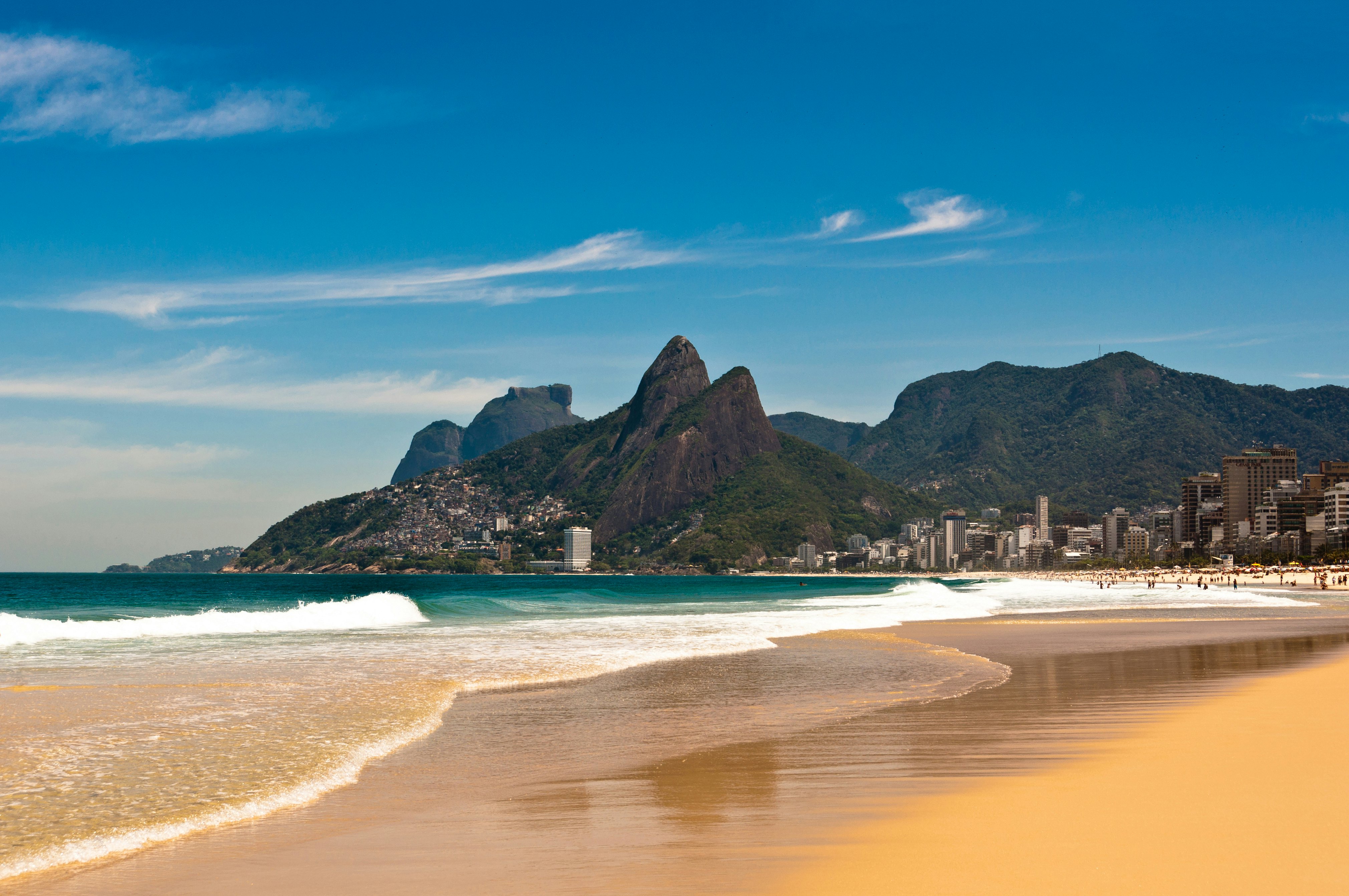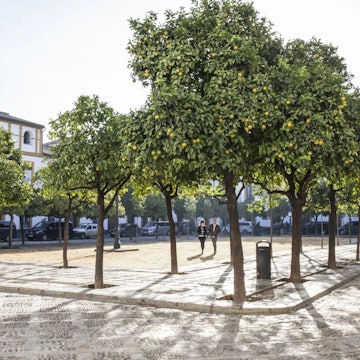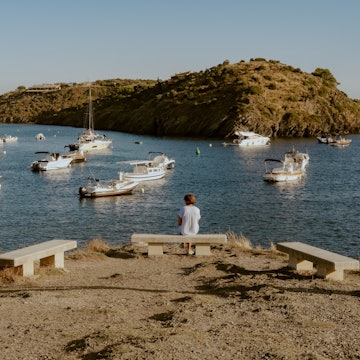

The golden sands of Byron Bay viewed from the road above. Alex Cimbal/Shutterstock
Lonely Planet's talented writers have traveled the globe in search of sublime, surf-pounded shorelines and remote pockets of hard-to-reach paradise that are worthy of featuring in Best Beaches: 100 of the World’s Most Incredible Beaches.
From fabled golden bays to little-known coves, from Albania to Tanzania, we've left no shell unturned during our hunt for the world's best beaches. Our team has swum, snorkeled, slugged cocktails and hiked through rainforests to create the definitive beach guide.
Start planning your next beach vacation with 25 of our favorites.
1. The Pass, Byron Bay, New South Wales, Australia
Best beach for surfers at every level
When the swell is good, The Pass has a right-hand point break that turns this stretch of pinkish-cream-colored, pillowy-soft sand into a surfer’s paradise located at Cape Byron – the most easterly point on mainland Australia. r The bay has something for everyone, whether you're a pro or novice, including lessons for beginners. (Note that since 2023, it is illegal to surf here without a board leash; heavy fines are issued to anyone breaking the law.)
Even if you’re not in the mood to surf, The Pass lets you explore local Aboriginal history, spot some koalas or hike along the area's scenic hiking, some of which are wheelchair-accessible.
Getting there: The beach has limited paid parking. Either arrive early or walk from central Byron (20 minutes; the foreshore has a wheelchair-accessible path). Alternatively, neighboring Captain Cook and Clarkes beaches also have limited parking.
RIO DE JANEIRO - APRIL 01, 2014: Groups of young Brazilians play keepy uppy beach football, or altinho, at sunset on the shore of Ipanema Beach at Posto 9., License Type: media, Download Time: 2025-05-28T09:45:27.000Z, User: lonelyplanetmedia, Editorial: true, purchase_order: 65050 - Digital Destinations and Articles, job: Global Publishing WIP, client: Global Publishing WIP, other: Peterson Haggarty // SS Comp Ingestion
2. Ipanema Beach, Rio De Janeiro, Brazil
Best beach to experience local culture
Renowned for astonishing sunsets that the locals applaud, Rio's Ipanema Beach stretches for 2.4km (1.5 miles). Local subcultures use its numbered lifeguard chairs to designate special areas of this famous Brazilian beach. For example, Posto 9, located off Rua Vinícius de Moraes, is the go-to spot for the fashionable crowd, attracting both the young and beautiful, alongside artists and hippies.
Praia Farme, situated in front of Rua Farme de Amoedo, is where the LGBTIQ+ community gathers. Posto 8 is where kids from the favela come together. Between Ipanema and Copacabana, Posto 7 is popular with surfers, and Posto 10 is where you'll find games of volleyball, soccer and futevôlei (footvolley) going on.
Getting there: Ipanema Beach is in the South Zone of Rio de Janeiro. Avenida Vieira Souto runs alongside the beach, and the closest Metrô station is General Osório.

3. Ao Maya, Ko Phi-Phi, Krabi, Thailand
Best beach for cinematic beauty
At just 15m (49ft) wide and 250m (820ft) long, Ao Maya is a slip of a Thai beach hidden by limestone cliffs. Yet it caught the eye of film director Danny Boyle, who used its ombré turquoise waters and fine white sand as the setting for The Beach, the 2000 film starring Leonardo DiCaprio. Unfortunately, all that popularity led to overtourism and heavy pollution, which forced authorities to close the beach for more than four years to allow the ecosystem to recover. It's once again open with new rules, including a visitor cap and infrastructure improvements, that will ensure Ao Maya's beauty is maintained.
Getting there: From neighboring Ko Phi-Phi Don, take an early-morning boat tour here (20 minutes each way) to avoid the busiest times. Alternatively, the island is reachable by speedboat from Phuket and Krabi.

4. Mnemba Island, Zanzibar, Tanzania
Best beach for next-level luxury
After you've spent a few action-packed days on safari in mainland Tanzania, you'll find Mnemba Island to be the perfect retreat. Only accessible to guests of the andBeyond resort, which sleeps 23, this gorgeous white-sand beach often feels like your personal coastal paradise. Indulge in long walks and enjoy some of the best scuba diving and snorkeling you’ll find on the entire continent.
Getting there: Resort stays include transfers from either Stone Town or Abeid Amani Karume International Airport on Unguja Island, Zanzibar. It's then a short boat ride to Mnemba Island.

5. Sarakiniko, Milos, Greece
Best beach for beautiful rock formations
You'll need to bring all your own supplies for Sarakiniko, a set of sun-bleached volcanic rocks that dip into a small deep turquoise stretch of the Aegean Sea. Centuries of wave-and-wind erosion made the rock formations at the beach dip and arch, creating caves to explore and alabaster cliffs to jump off. Sunbathe on the rocks or use them as your access point to slip into the water for some snorkeling. Ranked among the best-loved beaches in Greece, Sarakiniko can get packed with tourists. To avoid the crowds, visit in September and October. If you’re here during the high season, arrive in the morning for a calmer time at the beach.
Getting there: Sarakiniko is 3km (1.9 miles) north of Adamas port, on Milos’ northernmost coast. Several daily buses run here from Adamas during the summer months, and there’s parking available. Milos airport has domestic flights to and from Athens; you can also reach Milos by ferry from Athens’ Piraeus port (2½ to 6½ hours) as well as other islands such as Santorini (two hours).

6. Chesterman Beach, Tofino, Vancouver Island, British Columbia, Canada
Best beach for winter surf
Most people come to Chesterman Beach to surf, but there’s so much more to see and do here. This scenic Canadian shore is also great for kayaking, stand-up paddleboarding, whale watching and observing hundreds of colorful starfish, anemones, urchins and other sea creatures that appear in tide pools. The calm summer months are perfect for beginner surfers, and there are several expert-led surf schools based locally. Winter, with its serious swells, draws experienced surfers and is the time for surf competitions. Make sure you bring your wetsuit – water temperatures don’t get much higher than 13.8°C (57°F).
Getting there: Chesterman Beach is 5km (3.1 miles) south of Tofino, near the far west end of Vancouver Island’s Pacific Rim Highway. You can easily cycle here from Tofino. Regular ferries run between the city of Vancouver and Nanaimo (on Vancouver Island) in just under two hours. From there, it’s a 200 km (125-mile) trip west to Tofino – around a three-hour drive or a four-hour bus ride.

7. Cabo San Juan del Guía, Parque Nacional Natural Tayrona, Colombia
Best beach for rugged beauty
Ringed by rainforest, the golden sands and coconut palms of Colombia’s Caribbean coast are picture-perfect – especially Cabo San Juan del Guía. It is located in a national park that stretches along the coast from the Taganga near Santa Marta to the mouth of the Río Piedras, 35km (22 miles) east, and covers some 12,100 hectares (29,900 acres) of land and 3000 hectares (7400 acres) of coral-rich sea. While it is a bit of a hike (approximately two hours) to get to this set of picturesque turquoise bays enclosed by rocky outcrops, it’s well worth it.
Getting there: It takes an hour by bus from the Santa Marta Public Market to reach the El Zaino park entrance, 37km (23 miles) to the east, with frequent daily departures. From the park entrance, colectivos (minibuses) run to the beginning of the trail. You can also reach the beach via a two-hour hike or a rough 50-minute boat ride.

8. Anse Source d’Argent, La Digue, Seychelles
Best beach for seekers of paradise
With its pristine white sands shaded by coconut palms and shallow turquoise waters that gently lap against granite boulders, Anse Source d’Argent is commonly found on lists of the world’s best beaches and rightly so. This is the beach of dreams. It’s an adventure to get here, but a fun one that involves a ferry, a bike ride (or walk) to L’Union Estate, a former vanilla and coconut plantation that charges a small fee to access the beach.
Take a moment to tour the estate-turned-museum before you head 700m (0.43 miles) down the road to get your first glimpse of heaven on Earth. While you enjoy the beach, you can also sip on fresh fruit juices and coconuts (with rum, if you wish) from one of the rustic beach bars along the sand. To avoid the inevitable crowds, come in the early morning and return in the late afternoon (with your same entrance ticket) to enjoy the gorgeous sunset on a near-empty beach.
Getting there: It takes less than two hours to reach La Digue by ferry from Victoria on the main island of Mahé, and just 15 minutes by ferry from Baie Ste Anne in Praslin.
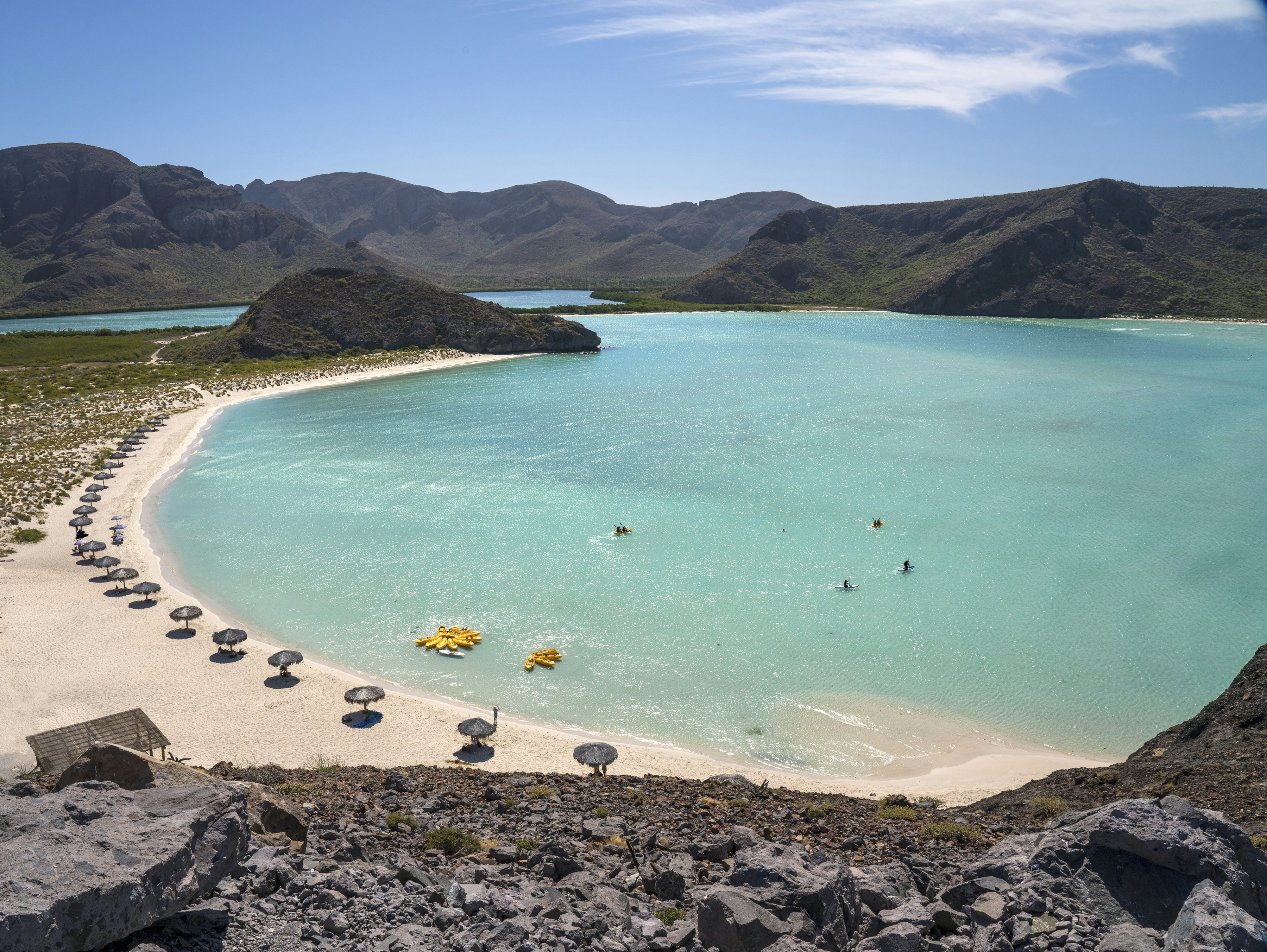

Meet your new travel partner
Get unlimited data while you travel with Holafly eSIM. Peace of mind and no hidden fees wherever you go.
9. Playa Balandra, La Paz BCS, Mexico
Best beach for activities
An enclosed cove beach with shallow, deep blue waters, Playa Balandra is one of Mexico’s most uniquely beautiful beaches. Apart from having great views, the beach is activity-oriented with kayaks and stand-up paddleboards available for rent. Beachgoers can also explore tide pools or hike to neighboring coves.
A protected area surrounded by arid, cactus-covered mountains, the beach is part of the azure Balandra Bay, which has glass-clear waters and white sands. Only 450 people are currently allowed on this beach per day, so it never feels too crowded, but it’s still best to get there early to secure a time slot (either 8am-noon or 1–5pm). The first Sunday of every month is exclusively reserved for locals, so make sure you plan your beach day in advance. Note that loungers and umbrellas are available to rent, but there are no other facilities.
Getting there: Make the 30-minute drive north from La Paz in a rental car or catch a bus from the La Paz Malecón bus station, with departures roughly every two hours from 9am.

10. Punta Paloma, Tarifa, Cádiz, Spain
Best beach for restorative mud baths
With its soft sands, sparkling waters and wind-carved dunes set against a backdrop of Morocco and the Strait of Gibraltar, Punta Paloma is one of the most seductive beaches in Spain. The deep blue Atlantic provides excellent water for swimming, dunes offer dazzling views, and natural mud baths let you can paint your skin with mineral-rich mud.
There are several walking and horseback-riding routes along the surrounding hills, some of which lead to sights such as the prehistoric Los Algarbes necropolis. If you’d rather stick to the beach, there are several opportunities for kitesurfing rentals and lessons. You’ll also likely catch a glimpse of dolphins, whales, migratory birds and maybe even a turtle.
Getting there: Punta Paloma is about 10km (6 miles) northwest of Tarifa, and is only linked by bus during the summer months. Tarifa is easily reached by car or bus from Málaga, Gibraltar, Jerez or Seville, all of which have international airports.

11. Punta Rata Beach, Brela, Makarska Riviera, Croatia
Best beach for dreamy sunsets
Punta Rata extends 400m (1312ft) around a headland protected by a nature reserve in a magical place where the Aleppo pine forests meet the cool, clear Adriatic Sea. One of the Croatian coast’s most exquisite beaches, Punta Rata's fragrant pine groves provide shade while its deep blue waters offer ideal temperatures (above 20°C/70°F from June to October) for swimming, snorkeling, kayaking or stand-up paddleboarding. This beach is pure bliss. Linger on the nearby promenade to catch magnificent sunsets – the sky glows with deep orangey-reds and neon pinks as the sun dips below the pine-dotted outcrop that rises from the sea.
Getting there: Punta Rata is on the northwest edge of Brela (easily reached on foot or by bike), around 50km (31 miles) southeast of Split on Croatia’s Dalmatian coast. Split has an international airport and good bus links to Brela (one hour).

12. West Beach, Berneray, Outer Hebrides, Scotland
Best beach for untamed beauty
The beaches of the Outer Hebrides look like they belong somewhere tropical rather than the North Atlantic shores of Scotland. West Beach is among the most picturesque – its powdery sands meet both jewel-like green-blue waters and machair (grazing land). The wilds of this shoreline make it look like an untouched paradise, but these three miles of coast are a draw for tourists as well as locals.
The brave might go for a swim in these chilly waters that rarely get above 13°C (55°F), but it’s a real paradise for beachcombers, bird-watchers and hikers. Grassy elevated dunes offer a perfect perch for pristine beach views and are the best place to spot cormorants, gannets and more. Come in the spring when the surrounding landscape is a burst of color thanks to the wildflowers that grow in abundance.
Getting there: West Beach stretches along the entire west coast of Berneray. You'll need to catch a ferry from Leverburgh in neighboring Harris (the southern half of the Outer Hebrides’ main island) to get here. There are flights from Edinburgh, Inverness, Glasgow and Southampton to Stornoway Airport in Lewis (the northern half of the principal island), which also has ferry links. You’ll need to rent a car to fully explore; be sure to book the ferry in advance.

13. Rauðasandur, Westfjords, Iceland
Best beach for hiking trails
Iceland’s Rauðasandur, located in the Westfjords, is a wild, 10km-long (6 miles) beauty with breathtaking sea cliffs and a turquoise lagoon that snakes through a sprawl of red, orange and pink sand – colors that come from crushed scallop shells. You might feel as if you have the beach to yourself, save for the company of grey and harbor seals that sometimes frolic on the shore. Rauðasandur also has some excellent hiking trails. It’s possible to walk to the famous Látrabjarg bird cliffs where thousands of puffins, razorbills, gannets and terns gather during the warmer months.
Getting there: Rauðasandur is 30km (19 miles) south of Patreksfjörður in the Westfjords, reachable on a one-hour flight from Reykjavík. It's a 400 km (640 miles) drive from Reykjavík, or you can catch the Baldur car ferry to Rauðasandur from Stykkishólmur, 170 km (106 miles) north of the capital. The often-unpaved roads in the Westfjords require time, patience, planning and a sturdy 4WD vehicle.
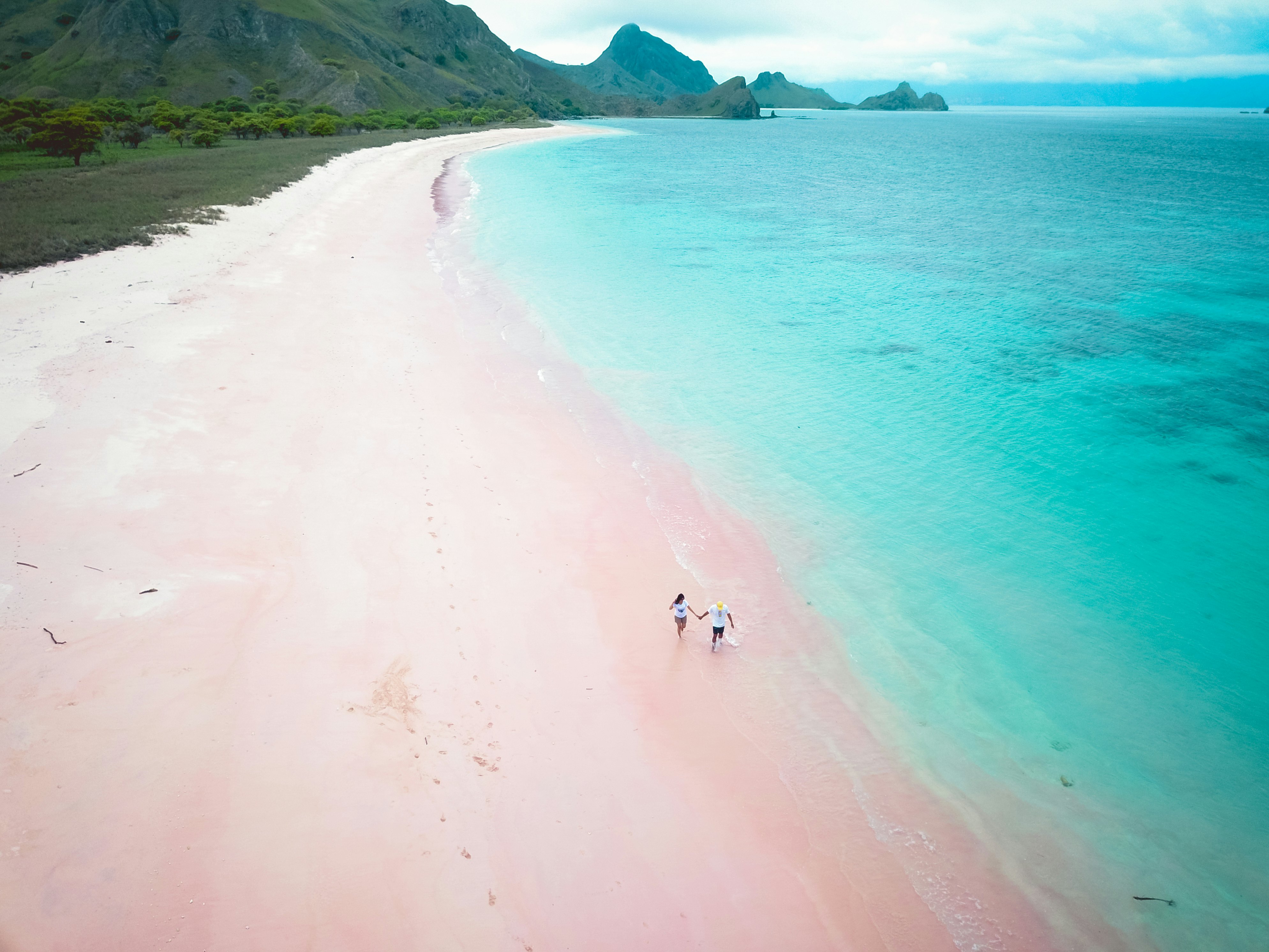
14. Pink Beach, Padar Island, Komodo National Park, Indonesia
Best beach for photogenic pink sands
Only a handful of beaches in the world have the rosy, cotton-candy sands of Pink Beach, located inside Komodo National Park. The sand's distinctive hue comes from deep-red organ pipe corals that have broken down offshore over centuries and mixed with fine white sand grains to produce a soft, pink shoreline. With an abundance of coral, the beach is a popular snorkeling spot – schools of tropical fish love the reefs, too. Simple beach huts dot the shoreline, offering drinks and simple meals as well as the only shade on these sun-drenched sands. Pink Beach is a popular spot; arrive early or just before sunset for a quieter experience.
Getting there: On the northwest shore of Padar Island, around 40km (25 miles) from Labuan Bajo, Pink Beach can only be visited on a day tour from the fishing town or a private day live-aboard cruise.

15. Dueodde, Nexø, Bornholm, Denmark
Best beach for snowy sand dunes in winter
The wild Baltic Sea surrounds Denmark’s sunniest island, Bornholm. Head to Dueodde on the southern tip to see why it's famed for its crisp natural light. The sun's rays kiss pearl-colored sands and make the soft jade- and cerulean-colored waves shimmer. Wading through shallow water here feels like stepping into a painting. In the evening, sunsets turn the sky pink, orange and yellow. Campsites and cafés are busy in the summer, so don't rule out visiting in the winter when locals toboggan down snow-covered sand dunes. For the best views, climb 196 steps to the top of Dueodde’s blue-and-white 1960s lighthouse.
Getting there: Dueodde’s main patch of beach is 10km (6.2 miles) south of Nexø, at the southern end of Bornholm, around 200km (125 miles) east of Copenhagen. There are parking lots at nearby Fyrvejen and Skrokkegard. Bornholm Airport has year-round 35-minute flights to and from Copenhagen, as well as seasonal links with Berlin, Aarhus and others. There are also regular ferry services to and from Ystad in Sweden (1¼ hours).
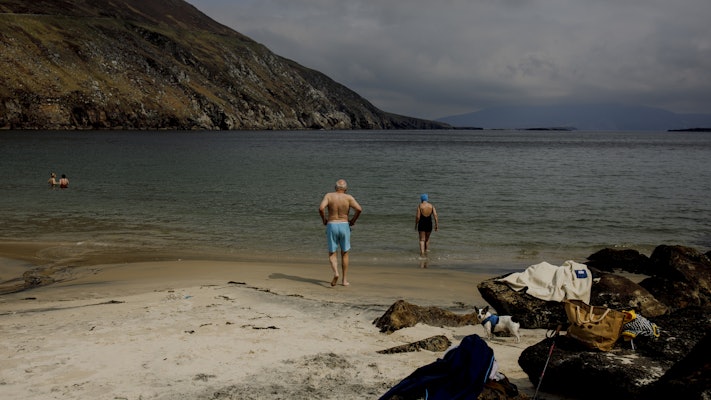
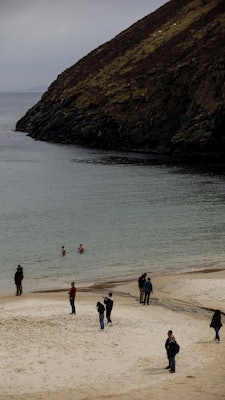
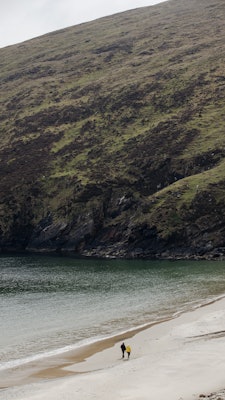

16. Keem Bay Beach, Keel, County Mayo, Ireland
Best beach for remote beauty
A short 8km (4.9-mile) drive from Keel village, at the western end of County Mayo’s Achill Island, is one of Ireland’s most glorious, secluded bays: Keem Bay Beach. The verdant green hillsides spill down to a deep-set horseshoe-shaped bay, where a pale-blonde beach sits framed by the Croaghaun Cliffs and the swell of the wild Atlantic.
Tucked away beneath the cliffs, the bay offers calm (if cool) waters. Swimmers and snorkelers can both take advantage of the gentle sea here. Launch a kayak from the shore during the warmer summer months for fabulous views of rural Ireland from the water. You might also glimpse pods of dolphins, which sometimes swim and feed by the bay.
Getting there: Keem Bay is accessible along western Achill Island’s snaking R319 road. The nearest airport is Ireland West Airport Knock, 95km (59 miles) east of Achill Island – a 1½-hour drive.

17. Ruby Beach, Olympic National Park, Washington, USA
Best beach for tide pools
Two miles south of the Hoh River and bordered by a rainforest, Ruby Beach in Olympic National Park is a great introduction to Washington State and the United States’ Pacific Northwest. It looks like waters have lashed wildly against the shoreline here until trees have toppled; in the ocean, sea stacks have a swirling froth crashing at their feet. This is a great place for beachcombers – agates, garnets and sea glass all glitter in the sand – but national park rules prohibit collecting anything except for a handful of unoccupied shells from the sand (never from tide pools).
Inside tide pools, you might see anemones, sea urchins, purple starfish and skittering crabs, making it a wonderland for children and adults alike. Be sure not to touch or disturb any of the creatures; it's best not to walk through tide pools themselves but to observe from the edges.
Getting there: Ruby Beach is on the southwestern coast of the Olympic Peninsula and borders Highway 101, which loops around the peninsula and the national park. The beach is 176 miles from Seattle-Tacoma International Airport.

18. Stanhope Beach, Prince Edward Island National Park, PEI, Canada
Best beach for bird watching
Stanhope Beach at Prince Edward Island National Park has some of Canada’s best beaches. Glistening wetlands meet the north coast of the Atlantic, with 40km (25 miles) of beach framed by rolling dunes that provide refuge for the endangered piping plover. Boardwalks hover above the red-gold sand and offer beautiful views of the coast while also connecting dunes to the shoreline. During summer the water is warm enough for swimming, and there’s a popular campsite among the trees just back from Stanhope Main Beach so you can stay for the beautiful sunset and wake up to waves lapping against the shore.
Getting there: Stanhope Beach is around 20km (12 miles) north of Charlottetown, PEI’s provincial capital, which has flights to Toronto, Montréal, Ottawa and elsewhere in Canada. You can also reach PEI by road from New Brunswick or by ferry from Nova Scotia. The national park is open year-round, but beach facilities are only available from mid-May to early autumn.

19. Radhanagar, Swaraj Dweep, Andaman Islands, India
Best beach for wildlife
For a secluded beach where it feels as if time has slowed down, look to Radhanagar. Located on India’s remote and beautiful Andaman Islands, this dreamy spot with the softest sand is backed by a bright green forest full of ancient species found nowhere else on earth. The region’s natural beauty is the main draw here. Come for some of the finest diving and snorkeling in India, look out for an elephant or two strolling along the shoreline, and gather with the locals who spend their evenings chatting as the setting sun casts blazing coral hues across the sky.
Getting there: The isolated Andaman Islands sit almost 1400km (870 miles) east of mainland India, so getting here is part of the adventure. Fly into Port Blair (the small regional capital on South Andaman), then catch a two-hour ferry to Swaraj Dweep. Radhanagar awaits on the island’s northwest coast, with a couple of eco-luxe resorts hidden among the trees.
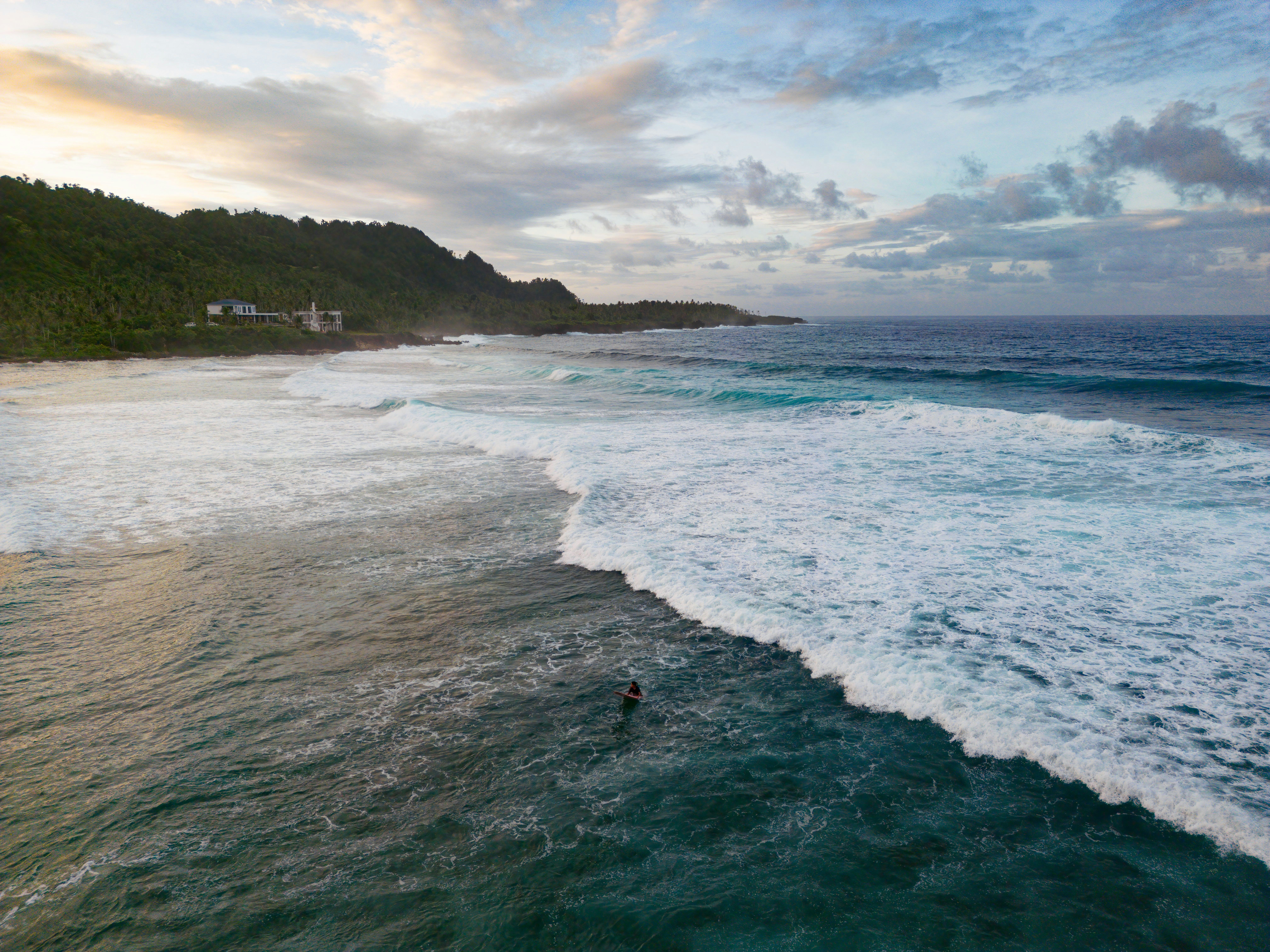
20. Pacifico Beach, Siargao, Surigao Del Norte, Philippines
Best beach for laidback surf vibes
A secret among surfers until fairly recently, Pacifico Beach is a picture-perfect tropical beach with azure-colored lagoon waters, coconut palm-shaded sands and a lovely, low-key vibe. When a devastating typhoon flattened the region in 2021, the locals’ resilience won out, and the island staged an incredible comeback. Many homes and businesses, including a handful of places to stay and eat in Pacifico, rebuilt and reopened within the year. This is one place where tourism is essential to the island’s ongoing recovery. Whether you’re looking for an idyllic beach to relax or a paddle across the lagoon for a left-hand reef break, Pacifico Beach and the fledgling beach town of Siargao is the place to go.
Getting there: Pacifico Beach is 21km (13 miles) or a 30-minute drive north of Surigao’s domestic airport, and 50km (31 miles) north of the island’s main tourism hub, General Luna. The drive from the latter, typically undertaken by rental scooter, takes just over an hour, but most visitors make a day of it, lingering at the many viewpoints and other attractions along the way.

21. Plage de Ta'ahiamanu, Mo'orea, French Polynesia
Best beach for snorkeling
It’s not often you find a public beach that feels like a (somewhat) private slice of paradise. Yet when you reach Plage de Ta'ahiamanu on the uniquely gorgeous French Polynesian island of Mo'orea, you will discover one of the region’s most beautiful beaches sporting soft sand, turquoise water, ideal conditions for swimming and snorkeling at sea, and even some great opportunities to spot local wildlife like tropical fish and sea turtles. And even though this beach sometimes feels like a remote nirvana, it’s open every day and free to the public.
Getting there: Plage de Ta'ahiamanu can be accessed from the main coastal road that wraps around the entire island. It’s about a 16km (10-mile) drive west of Mo'orea Airport, and it usually takes less than 30 minutes. It’s also about a 15-minute walk from the Hilton Moorea Lagoon Resort & Spa and within walking distance of several more hotels and inns.

22. Plage de Palombaggia, Corsica, France
Best beach for sparkling white sands
There may be no shortage of phenomenal beaches lining the Mediterranean Sea, yet there’s no European beach quite like Plage de Palombaggia on the French Mediterranean island of Corsica. Yes, this beach tends to draw major crowds, especially during peak summer season. But as long as you’re willing to brave the masses, you will be rewarded with a long and storied stretch of white sand beach, sparkling turquoise water that’s easily swimmable and seemingly endless vistas that make this one of the world’s most beautiful beaches.
Getting there: Plage de Palombaggia is a pretty straightforward 11km (7-mile) journey southeast of Porto-Vecchio – other than, of course, the windy Route de Palombaggia that leads from the RT10 highway down to the beach. Parking is usually available by the shore, but you may want to arrive early during the summer season as spaces fill up quickly.

23. Gardner Bay, Galápagos Islands, Ecuador
Best beach for remote wilderness
Located on Española Island, the southernmost of the Galápagos Islands, Gardner Bay may be the most visitor-friendly of Española’s beaches. Stretching for over 2km (1.2 miles), this white sand beach is a favorite among local sea lions and tourists seeking optimal rest and relaxation. Yet for those wanting more adventure, Gardner Bay is a great launchpad for swimming, snorkeling and kayaking. Prepare to encounter some sea turtles, marine iguanas, plenty of colorful tropical fish and maybe even a white-tipped reef shark. On land, you may spot animals like Hood mockingbirds, Galapagos hawks and lava lizards in addition to the famed sea lions.
Getting there: Simply put, you can only reach Gardner Bay by boat. You can either opt for a tour leading from San Cristobal Island or a multi-day cruise around the Galapagos Islands that includes a stop on Española.

24. Playa Manuel Antonio, Parque Nacional Manuel Antonio, Costa Rica
Best beach for rainforest adventures
Even though Manuel Antonio National Park is Costa Rica’s smallest national park, it’s nonetheless become the nation's most popular. Once you reach Playa Manuel Antonio, you can see for yourself why it’s so beloved. Nestled along a sheltered bay, this stretch of clean, blonde sand is blessed with calm turquoise water and an abundance of native wildlife. Not only do three species of monkeys (howler, white-faced and squirrel) call this beach and park home, but so do sloths, toucans, iguanas and many more animals. And whenever you want a change of scenery, take advantage of the park’s trails to experience more of this incredibly beautiful Costa Rican rainforest.
Getting there: This beach is located within Manuel Antonio National Park, which is about a 171km (106-mile) drive south of San José. If you want to stay closer to the park, you'll find some hotels just to the north of the park entrance. For more accommodations, the town of Quepos is about 7.5km (5 miles) away.

25. Playa Bahía de las Águilas, Parque Nacional Jaragua, Dominican Republic
Best beach for diamond-white sand
Punta Cana may have some of the Dominican Republic’s most famous beaches, but Playa Bahía de las Águilas on the other side of the island is most certainly one of the best beaches in the world. It features 8km (5 miles) of diamond-white sand, dazzlingly clear turquoise water and an abundance of local wildlife thanks to its location within the UNESCO-recognized Jaragua National Park. You might get to see some starfish and stingrays in the water; on land, you can explore one of the Caribbean’s best-protected expanses of subtropical dry forest.
Getting there: Due to its location near the southwestern tip of the Dominican Republic, Playa Bahía de las Águilas is far from the country’s major tourism hubs. It’s about 309km (192 miles) west of Santo Domingo and 503km (313 miles) west of Punta Cana. You will find a few inns and lodges around the nearby town of Cabo Rojo, where you can take a boat to the beach.









